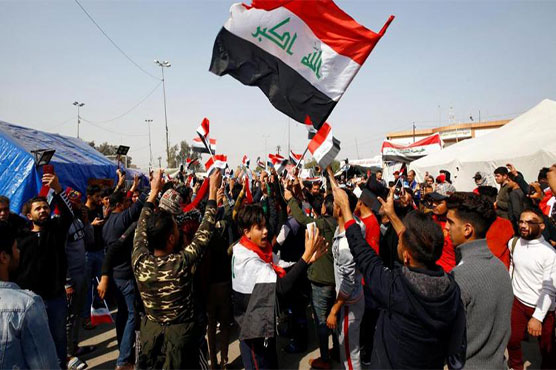Top Iraq cleric condemns deadly attacks on protesters

Moqtada Sadr criticised security forces for not doing more to prevent attacks on demonstrators.
KARBALA (AFP) - Iraq s top Shiite cleric on Friday criticised security forces for not doing more to prevent attacks on anti-government demonstrators, as new figures showed nearly 550 people have been killed since October.
Eight demonstrators were killed this week in attacks on protest camps by supporters of populist cleric Moqtada Sadr, including in the shrine city of Najaf -- home to Iraq s Shiite religious leadership.
In his weekly sermon delivered by a representative, Grand Ayatollah Ali Sistani condemned the bloodshed as "painful and unfortunate" and said state security forces are "indispensable" to keeping the country from "falling into the abyss of chaos."
"There is no justification for them to stop fulfilling their duties in this regard, or for anyone to stop them from doing so," Sistani said.
"They must bear responsibility for maintaining security and stability, protecting peaceful protesters and their gathering places, revealing the identities of aggressors and infiltrators, and protecting the interests of citizens from the attacks of saboteurs."
Sadr recently called on his supporters to ensure the reopening of schools, roads and government offices that had been shut by months of demonstrations.
Some 543 Iraqis have been killed in protest-related violence since unprecedented anti-government demonstrations calling for systemic reform erupted in the capital and southern cities in October, the Iraqi Human Rights Commission said on Friday.
Iraq s health ministry confirmed the first protester shot dead on October 1 but was unforthcoming thereafter. The Commission has since repeatedly complained that authorities declined its requests for information on deaths, injuries and arrests.
The Commission, which is government-funded but operates independently, became the only source for death tolls until it too faced pressure last year to stop reporting.
It has resumed its public reporting and on Friday shared its latest statistics with AFP, showing that 276 have been killed in Baghdad alone since the start of October.
Seventeen members of the security forces are among the dead nationwide, according to the updated list. The remaining are all protesters or activists, including 22 who were assassinated.
Many were killed by tear gas canisters, live rounds and even machine gun fire, which Sistani had condemned in previous sermons.
Up to 30,000 more have been wounded during the rallies, according to medical sources.
Iraq s government has repeatedly denied its security forces are shooting at protesters.
This week, demonstrators said they faced a new threat -- from supporters of Sadr, who initially backed the protest movement but then threw his support behind the nomination of Mohammad Allawi as Iraq s new prime minister last weekend.
Most protesters rejected two-time communications minister Allawi as too close to the political elite they had been demonstrating against for months.
Sadr supporters turned on the other demonstrators, driving them out of their protest camps in the centres of major cities.
In Hilla on Monday, one demonstrator was fatally stabbed as Sadrists, wearing their trademark blue caps, clashed with anti-government protesters.
And in Najaf on Wednesday, seven activists were shot dead after Sadr supporters stormed their camp.
Sistani s sermon appeared to have buoyed the remaining demonstrators in Baghdad s central Tahrir Square on Friday.
"I was watching, afraid that he would be too general and it would allow for more suppression of the protests," said one activist who gave his name only as Ali.
"But he was able to deliver a message: he accepts only the official security forces, no blue caps or anyone else."
In Diwaniyah further south, demonstrator Mohammad al-Bulani said the sermon showed Sistani s support for the protest movement.
"He is the only one that has stood with our demands and defended us," he said.
"We hope we don t lose this important support because everyone -- from political parties to militias and illegal armed factions -- is trying to annihilate us to end the demonstrations."

